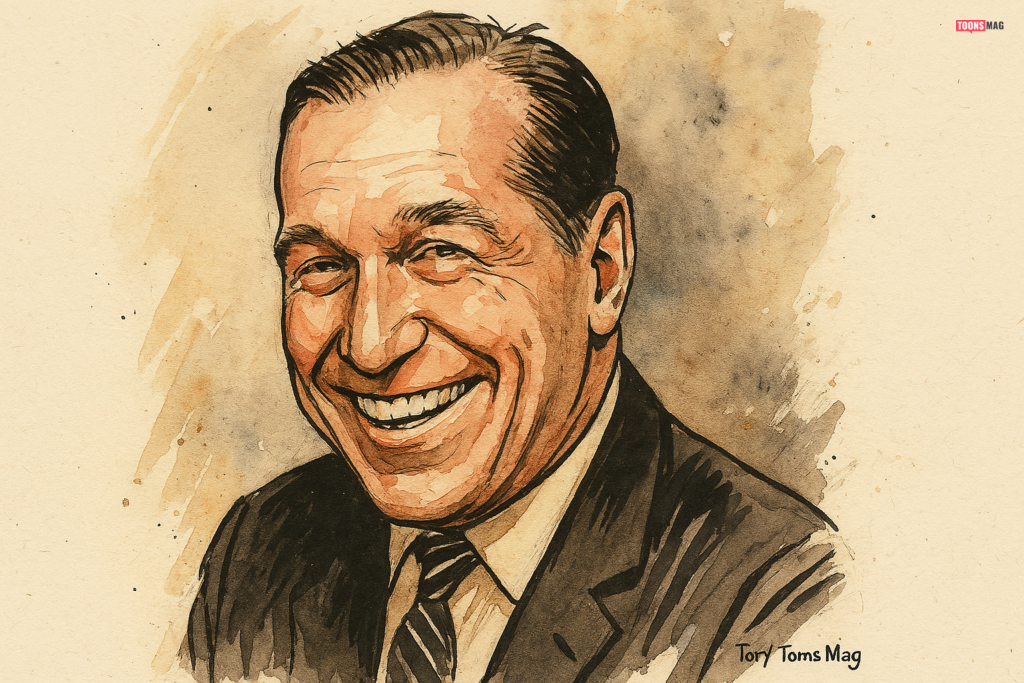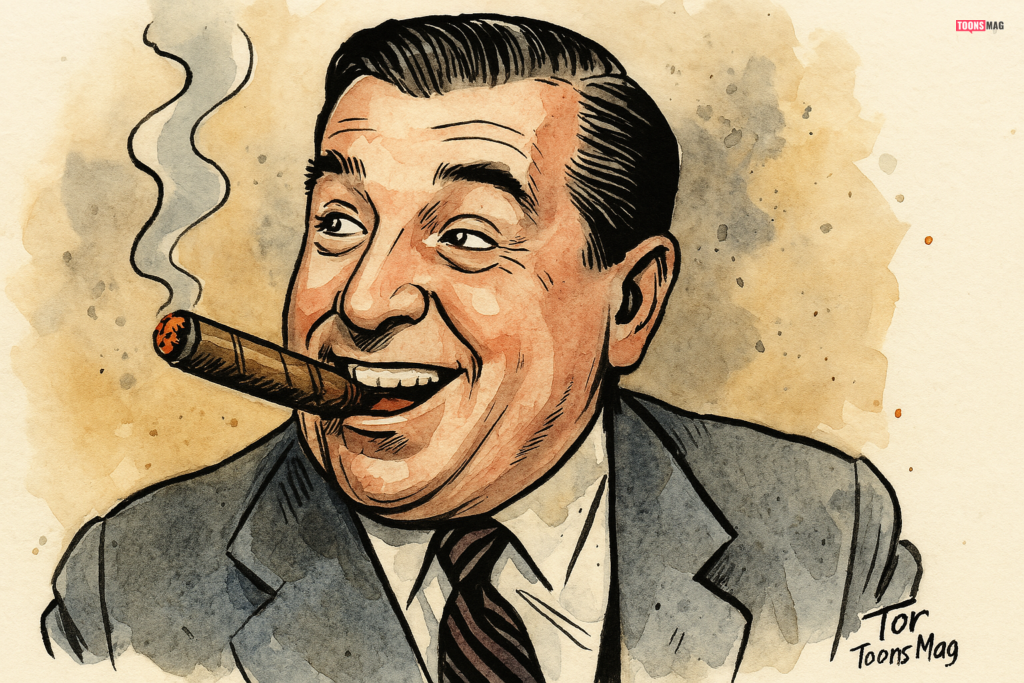Bob Dunn (March 5, 1908 – January 31, 1989) was an influential American cartoonist, entertainer, and gagwriter whose creative contributions left an indelible mark on the world of comic strips and television. Renowned for his wit, humor, and innovation, Dunn’s career spanned several decades, during which he created iconic comic strips, invented the modern knock-knock joke, and entertained audiences through various media platforms. In this in-depth article, we will explore the life, career, and lasting legacy of Bob Dunn, celebrating his achievements and examining his profound impact on the world of cartooning and entertainment.
| Bob Dunn | |
|---|---|
| Born: | March 5, 1908 |
| Died: | January 31, 1989 |
| Nationality: | American |
| Occupation: | Cartoonist, entertainer, gagwriter |
| Notable Works: | Little Iodine They’ll Do It Every Time Just the Type |
| Awards: | Reuben Award (1975) NCS Newspaper Panel Cartoon Award (1968, 1969, 1979) Silver T-Square Award (1957) Elzie Segar Award |

Early Life and Career Beginnings
Bob Dunn was born on March 5, 1908, and he demonstrated a talent for drawing and storytelling from a young age. His passion for cartooning led him to pursue a career in the field, and he began honing his skills while working at King Features Syndicate. Dunn’s early years in the industry were marked by perseverance and creativity as he submitted gags to newspapers and magazines, eager to make a name for himself in the competitive world of cartooning.

In 1936, Dunn achieved a significant milestone in his career when he purportedly invented the modern knock-knock joke—an enduring comedic format that would become a staple of popular culture. His book “Knock Knock: Featuring Enoch Knox” became a sensation, selling over two million copies and solidifying Dunn’s reputation as a comedic trailblazer. Buoyed by this success, Dunn continued to produce a series of bestselling books, including “I’m Gonna Be a Father,” “Hospital Happy,” and “One Day in the Army,” showcasing his wit and humor to audiences worldwide.

Contributions to the War Effort
During World War II, Bob Dunn’s talents were enlisted in service to the war effort. As noted in the September 19, 1942, issue of Editor & Publisher, Dunn made significant contributions to morale-boosting initiatives, entertaining troops with his caricatures, magic tricks, and amateur performances. His character Brassband Bixby, featured in his cartoons, became a beloved figure among service members, reflecting Dunn’s dedication to supporting the troops during a challenging historical period.

Syndicated Comic Strips
Following the war, Dunn’s career reached new heights when King Features Syndicate began syndicating his comic strip “Just the Type” in 1946. Although the strip never achieved widespread success, it provided Dunn a platform to showcase his unique artistic style and humor to readers nationwide. Despite the challenges of syndication, Dunn persevered, and his dedication to his craft eventually led to a byline on the acclaimed comic strip “They’ll Do It Every Time” in 1966.

Television and Entertainment
In addition to his work in print media, Bob Dunn significantly impacted early television as a host and entertainer. He starred in two television shows, “Face to Face” and “Quick on the Draw,” captivating audiences with his wit, charm, and artistic talents. Dunn’s appearances on television brought his comedic genius to a broader audience, further cementing his status as a beloved entertainer and personality.

The Knock-Knock Joke and Literary Success
In 1936, Dunn made comedic history by purportedly inventing the modern knock-knock joke. His book, Knock Knock: Featuring Enoch Knox, sold over two million copies and established the template for a joke format that would become a staple in American humor. This breakthrough catapulted Dunn into the public eye. He followed it with a series of bestsellers, including I’m Gonna Be a Father, Hospital Happy, One Day in the Army, and Magic for All, which showcased his sharp wit and accessible humor.
Wartime Contributions and Brassband Bixby
During World War II, Dunn took his humor to the front lines. He created the character Brassband Bixby, who enlisted in Navy Intelligence shortly after the Pearl Harbor attack, becoming a staple in wartime cartoons. Beyond the page, Dunn toured military camps and USO centers, entertaining troops with live caricatures, card tricks, and amateur magic. His efforts were recognized in Editor & Publisher in 1942, highlighting his commitment to uplifting the spirits of service members during turbulent times.
Just the Type and Postwar Syndication
After the war, Dunn launched Just the Type, a comic strip syndicated by King Features beginning May 5, 1946. The strip ran until November 24, 1963, and although it never became a major syndication success, it reflected Dunn’s personal brand of humor and creativity. Comics historian Allan Holtz noted that the strip likely continued as a side project while Dunn contributed more heavily to They’ll Do It Every Time, a well-established feature originally created by Jimmy Hatlo.
They’ll Do It Every Time and Little Iodine
Following Hatlo’s death in 1963, Dunn’s role in They’ll Do It Every Time expanded. He began receiving a formal byline in 1966, working alongside Al Scaduto. Their collaboration sustained the popularity of the long-running feature. Dunn also contributed significantly to the Little Iodine strip, a spin-off from They’ll Do It Every Time, bringing to life the mischievous antics of the comic’s young protagonist. His work on both strips helped shape post-war comic humor and connected with readers through relatable, slice-of-life scenarios.
Television Stardom and Quick on the Draw
Dunn’s charisma translated seamlessly to television. He starred in Face to Face (NBC, 1946–1947), and later in Quick on the Draw (DuMont, 1950–1952), a celebrity panel show where he drew cartoon-based charades. The show gained popularity for combining visual humor with audience participation. Dunn’s unique role as both host and cartoonist exemplified his ability to engage audiences in multiple formats. He was also featured in the 1966 NBC special The Fabulous Funnies, highlighting his enduring relevance in pop culture.

A Leader Among Cartoonists
Dunn was a central figure in the cartooning community. As one of the founding members of the National Cartoonists Society (NCS), he played a pivotal role in promoting the profession. In 1947, he joined a three-month nationwide tour organized by the NCS, performing alongside Rube Goldberg and others to help sell $58 million in U.S. Savings Bonds. Blending comedy, card tricks, and cartooning, Dunn’s performances became legendary.
He also served as the Official Toastmaster of the NCS and later as its President from 1965 to 1967, earning a reputation for his generosity, humor, and leadership. He was a beloved member of New York City’s Lambs Club, a theatrical society where he regularly contributed scripts, drawings, and performances.
Honors and Awards
Dunn’s contributions earned him numerous accolades from the National Cartoonists Society:
- Silver T-Square Award (1957): Recognizing outstanding service to the profession.
- Newspaper Panel Cartoon Awards (1968, 1969, 1979): Celebrating his excellence on They’ll Do It Every Time.
- Reuben Award (1975): The highest honor from the NCS, acknowledging his lifetime achievement in cartooning.
- Elzie Segar Award: Honoring his exceptional contributions to the art of cartooning.
His collaborative efforts with Al Scaduto on They’ll Do It Every Time also garnered critical acclaim and sustained the comic’s popularity well into the late 20th century.

Later Years and Lasting Legacy
Even as trends in comics evolved, Dunn remained a respected and active figure in the industry. His January 10, 1966, appearance on the CBS game show To Tell the Truth is a testament to his mainstream recognition. Until his passing in 1989, Dunn continued to contribute to the comic world and support fellow cartoonists.
His innovations—particularly the popularization of the knock-knock joke—resonate in today’s humor. Through his syndicated strips, TV appearances, and public performances, Dunn brought joy to millions and paved the way for future cartoonists to experiment with multimedia formats.
Bob Dunn was more than a cartoonist; he was a humorist, showman, and cultural icon. From wartime morale-building to pioneering visual gags on television, Dunn used his talents to entertain and inspire. His work lives on through the continued appreciation of They’ll Do It Every Time, Little Iodine, and the enduring simplicity of a knock-knock joke. As we reflect on Dunn’s extraordinary career, we recognize him as a cornerstone of American cartooning whose influence remains as vivid today as it was during his lifetime.
Frequently Asked Questions (FAQs) about Bob Dunn:
Who was Bob Dunn?
Bob Dunn (March 5, 1908 – January 31, 1989) was an American cartoonist, entertainer, and gagwriter known for his contributions to various comic strips, including “Just the Type” and “Little Iodine.”
What is Bob Dunn best known for?
Bob Dunn is best known for his work on comic strips such as “Little Iodine” and “They’ll Do It Every Time.” He is also credited with inventing the modern knock-knock joke in 1936.
What were some of Bob Dunn’s notable achievements?
Bob Dunn won several awards throughout his career, including the National Cartoonists Society Newspaper Panel Cartoon Award in 1968, 1969, and 1979. He also received the prestigious Reuben Award from the National Cartoonists Society in 1975.
What contributions did Bob Dunn make to the comic industry during World War II?
During World War II, Bob Dunn contributed to the war effort by creating comics that entertained and boosted morale among the armed forces. He made personal appearances at Army camps and USO centers, entertaining service members with his caricatures, magic, and card tricks.
Did Bob Dunn work in other entertainment mediums besides comics?
Yes, Bob Dunn also ventured into television. He starred in two television shows in the early days, including “Face to Face” and “Quick on the Draw.” He also appeared on network television specials and game shows.
What awards did Bob Dunn win for his work in comics?
Bob Dunn won the National Cartoonists Society Newspaper Panel Cartoon Award multiple times and received the Silver T-Square Award in 1957. His most notable achievement was winning the Reuben Award, the highest honor bestowed by the National Cartoonists Society, in 1975.
What was Bob Dunn’s role in the National Cartoonists Society?
Bob Dunn was an active member of the National Cartoonists Society and served as its President from 1965 to 1967. He contributed to the society’s activities, including making personal appearances and participating in charitable events.
How did Bob Dunn entertain audiences during his career?
Bob Dunn entertained audiences through his cartoons, magic tricks, and personal appearances. He was known for his witty humor and engaging performances on stage and television.
What impact did Bob Dunn have on the comic industry?
Bob Dunn’s contributions to the comic industry helped shape the landscape of cartooning during his time. His inventive humor and creative storytelling influenced generations of cartoonists and entertained audiences worldwide.
What is Bob Dunn’s legacy in the world of comics?
Bob Dunn’s legacy in the world of comics is characterized by his humor, creativity, and lasting impact on the industry. His iconic characters and contributions to comic art continue to be celebrated by fans and fellow cartoonists alike.
This post was created with our nice and easy submission form. Create your post!




One Comment